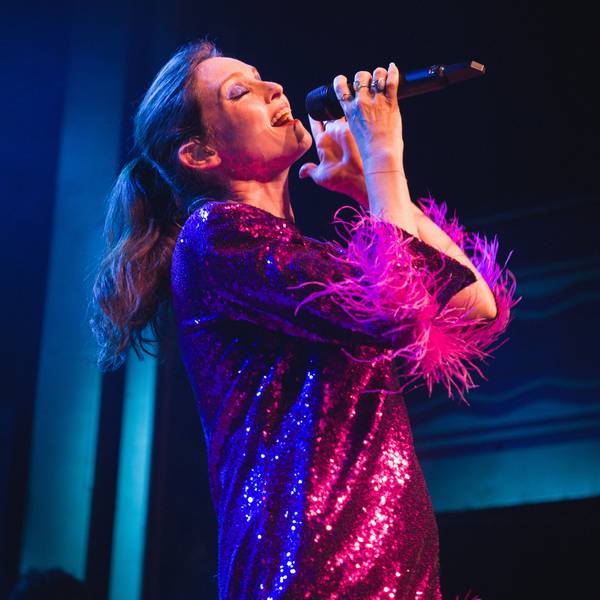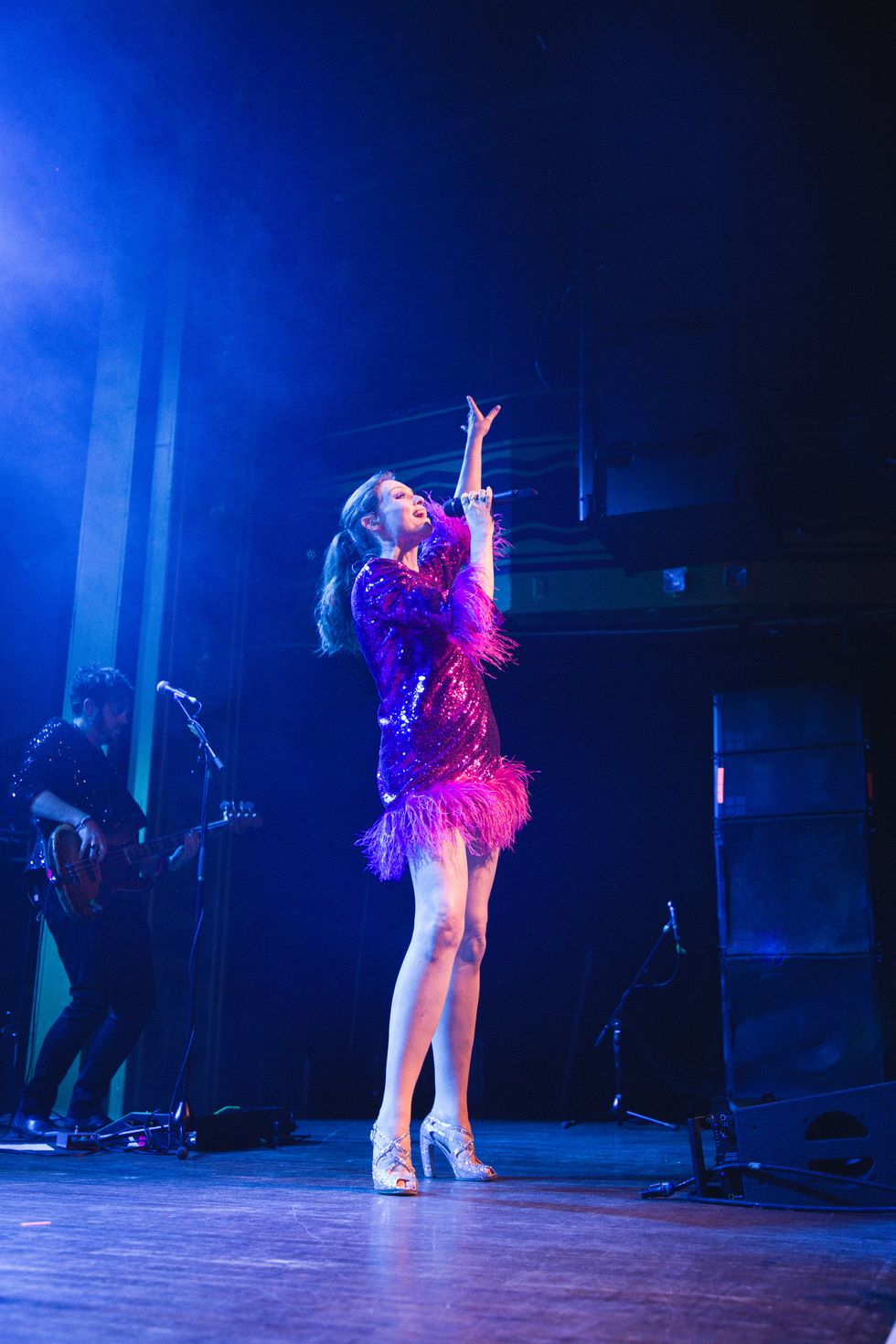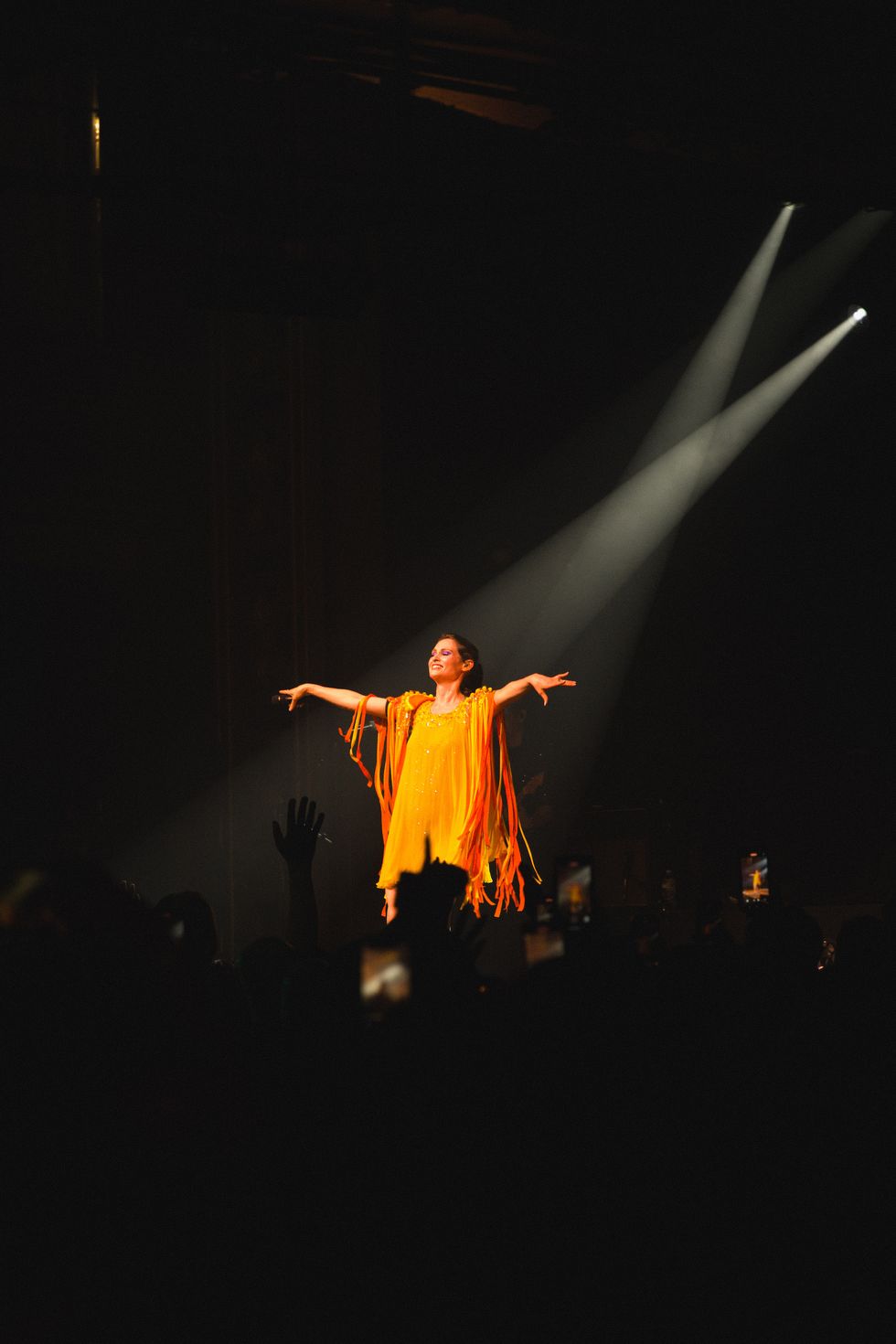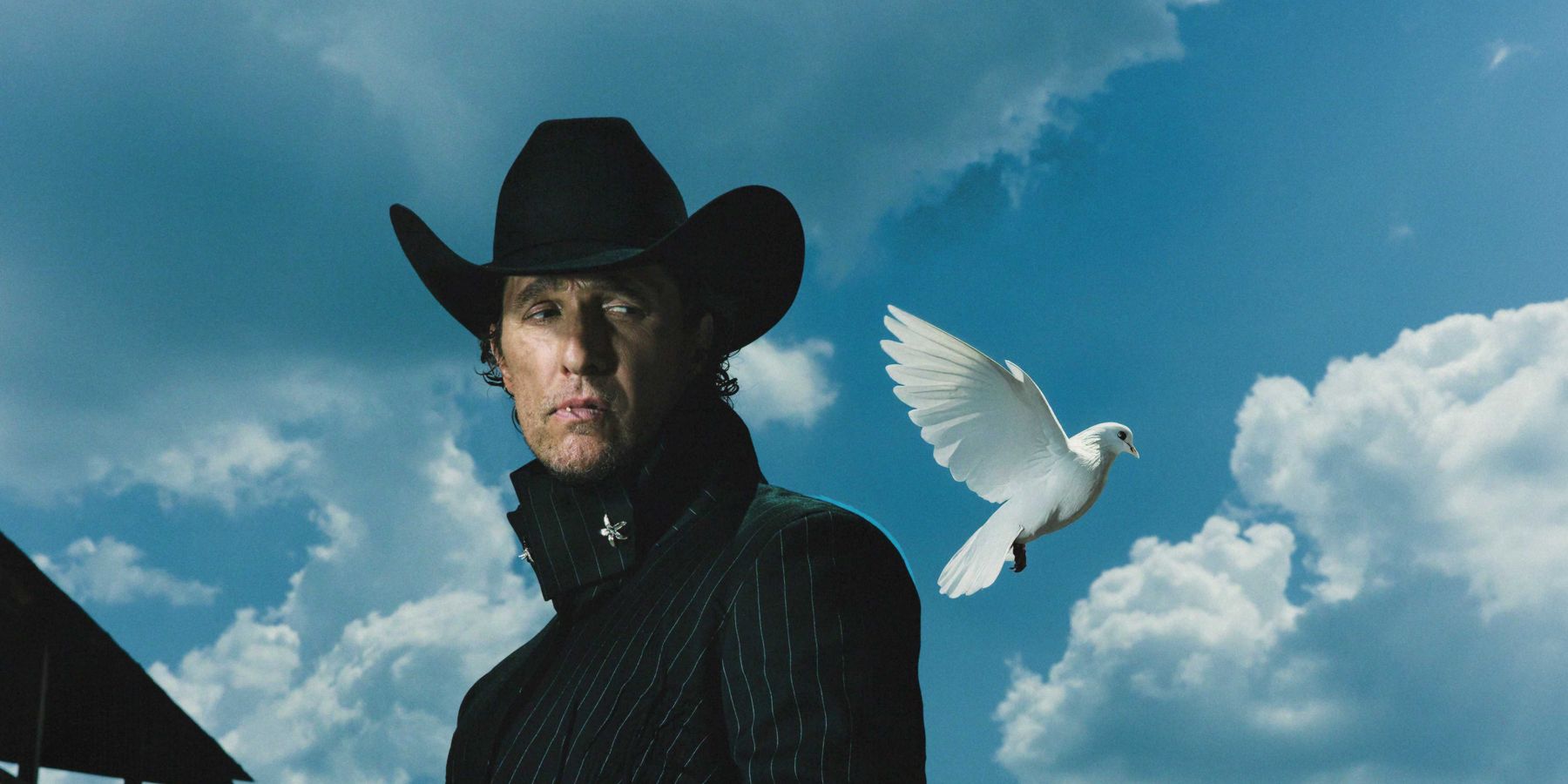
Sophie Ellis-Bextor Never Left the Dancefloor
By Joan Summers
Jun 12, 2024I’m standing nervously in the rain while a group of both middle-aged men and 20-somethings swarm around Sophie Ellis-Bextor's trailer outside Webster Hall in the East Village. A security guard asks me to get in line down the block, and as I flash my press credentials, I catch a few of the assembled girls and gays whisper amongst themselves. The guard nods as I huddle closer to the wall, my sundress and platform heels feeling like the worst mistake I could have made on a previously beautiful summer afternoon. Nearby, a couple who’d been gossiping loudly gasps as Ellis-Bextor emerges from the RV. I begin to feel the linen clinging to my skin, the downpour intensifying with the mood outside.
Throwing a knowing wave at her tour manager, I fall a few paces back while she autographs paraphernalia and takes selfies. That same couple’s eyes are wide, and they tell her they’ve waited over twenty years for the pop songstress to perform stateside. Ellis-Bextor’s smile is warm, and she cracks on about her rained on appearance, and how excited she is to see everyone. Another group has traveled from the Midwest, and a man comes running down the street exclaiming he was worried he’d missed her. As her tour manager calls it and ushers us both inside, I catch the couple from before whispering that they’d checked her Instagram stories to track her location, desperate to get one glimpse of her. My grin doesn’t fade until we’re seated in the dressing room, safe from the rain that has completely ruined my outfit.
The recent success of Sophie Ellis-Bextor’s “Murder on the Dancefloor” surprised just about everyone, Ellis-Bextor included. In countless interviews since the release of the film Saltburn gave the track new life, the British pop fixture has answered just about every variation of the question: Did she ever think a 2001 single would be the most buzzed-about song of 2023? No, of course not. But, as she tells me later in her dressing room, “I hope it gives a little bit of comfort to other artists and bands and people out there that there's no real set pattern of what's going to happen, you know?” It’s a perspective that can only come with thirty years in the business since she debuted with British rock band Theaudience in 1996. “You literally don't know where the map will lead you. So you might as well just have a lot of fun and experience what’s in front of you.”

On the topic of Theaudience, Ellis-Bextor’s first band broke up in 1999, after Mercury dropped them while working on their second album. “Because my band split up, I really thought I was high and dry. But then I got asked if I wanted to collaborate with this Italian DJ, and I had no idea that that song would be something that would do so well commercially.” That song, Spiller’s 2000 single “Groovejet (If This Ain’t Love),” entered the UK’s Singles Chart at No. 1, and led to a solo career for Ellis-Bextor that has persisted to this day. “I think that taught me a little bit about magic, really, and being open to stuff, because you can’t really plan that much. You're so encouraged to think you can plan.”
It was through “Groovejet” that I first became aware of Sophie Ellis-Bextor, on the pop culture board ATRL in 2005. Then called Absolute TRL, British fans evangelized about her debut solo album, Read My Lips, and down the hole I went, a hole I happily lived in. I evangelized myself for the following 15 years, late night, when gay people would assemble to watch music videos at the afters or at karaoke, where puzzled friends would sway along to “Heartbreak (Make Me a Dancer)”. Even underneath the DJ booth, begging them to take “Murder on the Dancefloor” for a much-needed spin. Back at Webster Hall, I mention the newly bridged distance between her fans across the Atlantic and here in the States, curious why she doesn’t think it hit the same in the early 2000s. “When I was releasing my first album, it wasn’t what was happening here in the States. This is before EDM had really done its thing, and the sound of my music was very European.”
I mention that other longtime Euro-staples like Kylie Minogue have experienced a similar renaissance with overseas listeners, and she brushes off the comparison. “To my perception, Kylie had already been known about in America!” But I insist, positing that maybe we’ve defeated the sexist adage that pop music has an expiration date, or that the genre is inherently for the young. “It’s like, none of that was true. It was, in fact, probably all made up by blokes in a boardroom. It was definitely not coming from women.” She continues: “I should have known better, because it wasn’t how I thought about music, or any of it. There was a head honcho at that label, who was very keen on telling me what people my age were buying, and I was thinking, ‘Why doesn’t he just ask me?’” She laughs, and brushes aside the memory. “I guess, ultimately, none of it really mattered.”

Later, at Alphabet Bar across the street, her label reps at Republic tell me that various labels have focused on back catalogs as yesteryear’s music has surged to the fore. Young people have always looked backward after a fashion. That said, the reality of new music releases has altered dramatically, in part because of how TikTok has fundamentally changed the concept of music discovery, and how that music is passed around the culture. In fact, I recently spoke with Nelly Furtado under similar pretenses, and even Heidi Montag earlier this year. There are more contemporary examples. Chappell Roan’s Rise and Fall of a Midwest Princess made its Billboard 200 chart debut earlier this year a full six months after its release, with a recent peak of No. 23, a surge in sales buoyed by TikTok’s reception of “Good Luck, Babe!” and a string of buzzy festival performances.
A question bubbles up toward the end of our conversation, and I ask Ellis-Bextor if there’s another song she’d want a “Murder on the Dancefloor” moment for. Her answer floors me with its clarity. “I don’t think it works like that. When you put music out into the world, it’s never a static moment. You put a song out because you want to start a dialogue. It’s like a conversation.” To Ellis-Bextor, what happened to “Murder” is something special, a chapter she doesn’t want to recreate, but expand on. “You put out a song and then people reflect it back to you, and then it always evolves. For me to start flinging out other songs would almost be like me not understanding how special that is. I don’t really need to dilute it.”

The poignancy of the answer comes back to me, perched on the balcony overlooking the crowd. “Get Over You” transitions into a megamix of “Lady (Hear Me Tonight)” and “Groovejet” and ABBA’s “Gimme! Gimme! Gimme!”. She follows it up with “Not Giving Up On Love” and a cover of Madonna’s “Like a Prayer,” bounding and spinning across stage, weaving the sorts of spells that caused me to scream on more than one occasion. “Heartbreak (Make Me a Dancer)” bleeds into her final act, as a massive disco ball lowers from the ceiling. A series of multicolored spotlights spray a million stars across the crowd.
A few catch in the tears that cloud my vision as she closes the set with “Murder on the Dancefloor", and I hastily wipe them away despite my mascara, wanting the moment to stretch out forever.
One by one those stars twinkle out, and the crowd erupts, chanting, screaming, begging her back. No surprise that she springs back onstage for an encore of “New York City Lights” and “Bittersweet,” but it's the next bit that crowded out all others on the drive home, down the Jersey Turnpike past midnight. Upstairs, I hear a commotion to my left, and realize I am standing not one pace from Ellis-Bextor, who’s been hurried to the balcony. A spotlight on her hushes the crowd to total silence, and out across the sea of rapturous faces, Ellis-Bextor sends us off into the sticky New York night with a stripped-back, mic-less rendition of Theaudience’s “A Pessimist Is Never Disappointed.” It’s off the album that preceded the band’s breakup, the same album that led to so many unexpected twists of fate for Sophie Ellis-Bextor.
It goes something like: “Hey sunshine! I'll never shake your pride/ You're what I need/ You've been anointed/ This is the highlight of your miserable life/ A pessimist is never disappointed.” I couldn’t have said it better myself, because she did, already and more in the last six months, and earlier in the dressing room. “The songs I brought with me on tour, they still evolve, because all the memories I make, seeing people sing them back to me, or having that energy in the room. It all evolves, it all layers.”
What a highlight of this sometimes miserable, oftentimes unexpected life.

Photography: Andrew Angel
From Your Site Articles
Related Articles Around the Web
MORE ON PAPER
ICONOS: Pepe Aguilar, El Oficio del Tiempo, la Voz del Silencio y el Peso del Legado
Español
Jan 19, 2026
Entertainment
Cynthia Erivo in Full Bloom
Photography by David LaChapelle / Story by Joan Summers / Styling by Jason Bolden / Makeup by Joanna Simkim / Nails by Shea Osei
Photography by David LaChapelle / Story by Joan Summers / Styling by Jason Bolden / Makeup by Joanna Simkim / Nails by Shea Osei
01 December
Entertainment
Rami Malek Is Certifiably Unserious
Story by Joan Summers / Photography by Adam Powell
Story by Joan Summers / Photography by Adam Powell
14 November
Music
Janelle Monáe, HalloQueen
Story by Ivan Guzman / Photography by Pol Kurucz/ Styling by Alexandra Mandelkorn/ Hair by Nikki Nelms/ Makeup by Sasha Glasser/ Nails by Juan Alvear/ Set design by Krystall Schott
Story by Ivan Guzman / Photography by Pol Kurucz/ Styling by Alexandra Mandelkorn/ Hair by Nikki Nelms/ Makeup by Sasha Glasser/ Nails by Juan Alvear/ Set design by Krystall Schott
27 October
Music
You Don’t Move Cardi B
Story by Erica Campbell / Photography by Jora Frantzis / Styling by Kollin Carter/ Hair by Tokyo Stylez/ Makeup by Erika LaPearl/ Nails by Coca Nguyen/ Set design by Allegra Peyton
Story by Erica Campbell / Photography by Jora Frantzis / Styling by Kollin Carter/ Hair by Tokyo Stylez/ Makeup by Erika LaPearl/ Nails by Coca Nguyen/ Set design by Allegra Peyton
14 October
Entertainment
Matthew McConaughey Found His Rhythm
Story by Joan Summers / Photography by Greg Swales / Styling by Angelina Cantu / Grooming by Kara Yoshimoto Bua
Story by Joan Summers / Photography by Greg Swales / Styling by Angelina Cantu / Grooming by Kara Yoshimoto Bua
30 September




